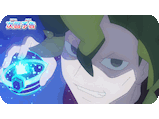
107



Main
Old Updates Archive
Links
 |
Lists |
List of Pokémon
Pokémon World Atlas
List of Techniques
List
of Items
List of TV Episodes
 |
Guides |
Episode
Comparisons
Movies
& Specials Guide
CD Guide
DVD Guide
Voice
Actors Guide
Lyrics Archive
Manga Guide
Video Games
 |
Miscellaneous |
Humor
Pokémon Bashing
Features
Rants
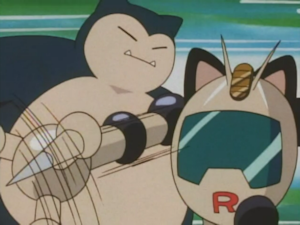
Japanese Episode 107: "Enter the Kabigon!"
American Episode 302: "Pokémon Food Fight!"
Pokémon Dare Da? Kusaihana (Japanese), Marowak (English)
Dr. Ookido's Pokémon Course: Iwark
Japanese Air Date: August 5th, 1999
American Air Date: August 19th, 2000
Important Characters: Junji (Gulzar)
Important Places: Kunenbo Island (Butwal Island)
Satoshi and
his friends are stranded on Kunenbo Island , searching the area for
food, when Satoshi gets challenged to a Pokémon battle by a
local boy named Junji. During their match Satoshi accidentally drops
the Monster Ball belonging to his Kabigon, breaking it and making him
unable to recall his gluttonous Pokémon! The battle is called
off and Satoshi is dismayed to learn he'll have to somehow get his
Kabigon over a mountain in order to reach the nearest Pokémon
Center…!? Transporting the 460 kg Pokémon uphill proves to be a
huge challenge but an apple costume and a lot of frantic running
enables Satoshi and his friends to complete the trip in record time.
Once they arrive at the Pokémon Center our heroes find that the
latest shipment of food that had parachuted in from a neighboring
island has been stolen by the Rocket trio! As Musashi and Kojirou taunt
the people of the island Nyarth shows up in an armored suit and
challenges Satoshi to a battle. The fight between Pikachu and "Armored
Nyarth" is about to end badly when, all of a sudden, Satoshi's Kabigon
arrives on the scene to join the battle! The "Sleeping Pokémon"
uses a newly learned Hyper Beam attack to send the trio blasting off
before rushing over to the shipment of supplies and gorging itself out
on its contents. Later, Satoshi gets Kabigon's Monster Ball repaired at
the Pokémon Center, allowing him and his friends to leave for
their next adventure.
Thoughts
I rewatched the entire Orange Islands arc a few years ago in advance of me starting work on this batch of episode comparisons, and yet despite having seen these all fairly recently there are still a few episodes where I sit down and go "y'know, I don't think I've ever seen this before in my life." For some reason, "Enter the Kabigon!" is one such episode. Like, I remember the image of Satoshi dressed up like an apple, and Junji with all those flowers tucked into his headband, and of Nyarth in his "Armored Nyarth" mecha. But, if a few weeks ago someone had asked me to summarize this episode for them, based purely on memory, I wouldn't have been able to tell you anything about what happens in it.
I don't really know why, because at the end of the day this is a fairly decent episode. It's not ground breaking, but it's not as bad as, say, the previous episode either. The storyline's fairly unique! Junji's a fun character! The pacing of this two-stories-in-one episode is well done! And look, the whole thing's presented to us by superstar animator Masaaki Iwane! There's a whole lot to like about this perfectly fine, B or B+ episode, and yet for some reason my brain just absolutely refuses to reserve any space for it. I'm familiar with it now because I've been living with it these last few weeks, but will I remember this episode a month from now? Six months? A year? I'm not really confident I will, and I wish I knew why.
But, like I said, it's an OK episode. Kabigon's Monster Ball malfunctioning is a great way to force Satoshi to actually deal with the newest addition to his team, though the fact that a Monster Ball can even break in the first place opens up all sorts of questions about the world building behind them. Just what are Monster Balls made of, anyway? Are they any more/less durable when shrunk down compared to when they're expanded to full size? Why does dropping a Monster Ball on a rock make it unusable, yet when our heroes literally go over a waterfall later in the episode every other Monster Ball seems to be perfectly fine? The answer to this is obviously that it doesn't really matter, and that the items are going to be about as durable or delicate as the plot dictates, but it's still a neat thing to think about.
Either way, an episode centered around Satoshi's Kabigon is nice, and having it learn a super powerful move like Hyper Beam is a great way to make sure it'll get used in future episodes. If nothing else, the Orange Islands will work hard to make sure Satoshi doesn't have any dead weight on his team -- first with Lizardon, and now with Kabigon -- so I have to give the episode props for doing the work needed to make Kabigon a usable member of the team. It's an important, well made episode; I just wished I liked it more (shrugs).
The script for the English dub is actually pretty different this time around, which is odd considering how nothing episodes like this one tend to get the more faithful script adaptations. There are better episodes and there are worse episodes, adaptation wise, but there's still more than its fair share of rewrites here. This is also the first episode to feature 4Kids' low-key racist "well, we think this looks sorta-kinda like Japanese writing, maybe, so we're just gonna erase it" type of Paint Edits, a new type of change we'll unfortunately be seeing a lot more of throughout the rest of the series.
Dialogue Edit
As usual, the narrator gets things started:
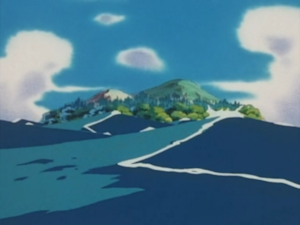
| Japanese
(original) |
Japanese
(translated) |
English
Dub |
| ナレーション 「クネンボ島に着いて1週間。連日海は荒れサトシたちは島を離れ
ることもできず野宿の毎日だった」 |
Narrator: "It's now been one
week since our heroes have landed on Kunenbo Island. For several days
in a row now the
sea around the island's been too rough to set sail, and so Satoshi and
his friends have
been stuck spending their days roughing it out in the wild." |
Narrator: "A storm far out to
sea has made the ocean too dangerous to sail, so our heroes have been
stranded on this island for a
whole week! And the waves aren't getting any smaller." |
This is mostly the same, but the English dub doesn't bother telling us the name of the island this episode takes place on the way the Japanese version does.
The children worry about food:
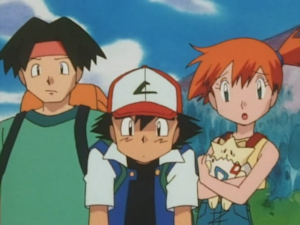
| Japanese
(original) |
Japanese
(translated) |
English
Dub |
| サトシ 「これじゃ、今日も海へ出るのは無理だな~」 |
Satoshi: "Looks like we won't
be able to set sail today, either." |
Ash: "Uh, maybe we're all
gonna be stuck on this island for the rest of our lives." |
| カスミ 「どうしよう?ポケモンフーズも
あたしたちの食料も底を突いてきたわ」 |
Kasumi: "What're we gonna do?
Both our supplies of Pokémon Food and our human food are running
out." |
Misty: "Well, I hope you're
wrong as usual, or else we're gonna run out of food for ourselves and for our Pokémon." |
"Well, I hope you're wrong as usual?" What the hell, Misty?
Tracey has a plan:
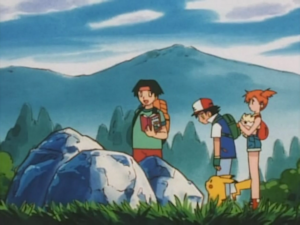
| Japanese
(original) |
Japanese
(translated) |
English
Dub |
| ケンジ 「ポケモンのごはんならなんとかなるよ。ポケモンフーズが切れたときは
自然の植物からポケモンの食べられる物を探す方法があるんだ。おっ! これなんかポケモンにあげても大丈夫な草だな」 |
Kenji:
"Well, we can at least work something out for the Pokémon. When
you run
out of
Pokémon Food you can always search the plants out in nature to
find something for them to eat. Ah, here we are! It looks like this
grass
here is
safe to
give to Pokémon." |
Tracey: "Feeding the Pokémon shouldn't be a problem, Misty. According to my Pokémon Trainer's guide here, there are dozens of wild plants on this island that Pokémon love to eat. Hmm. It says these flowers are very delicious...to Pokémon, I mean." |
As you'll see in the images below, the "Pokémon Trainer's Guide" Tracey's supposedly referring to is really just a book with three yellow daisies on the cover...? In the original Kenji doesn't bring up the book to which he's referring.
I'm also a little surprised 4Kids didn't leave in the part where Kenji mentions this grass being safe to eat, since the "hey kids, don't just eat whatever random plants you find out in the wild" message is exactly the kind of educational moral networks like Kids' WB! love to include in their kids' shows.
Paint Edit
The "text" on Kenji's book gets erased from the English dub.
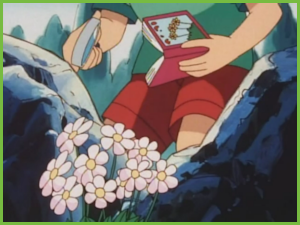 |
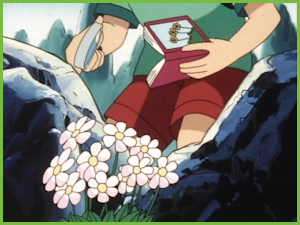 |
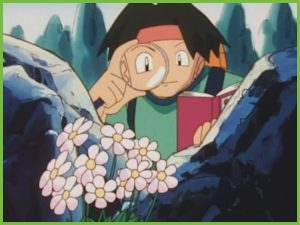 |
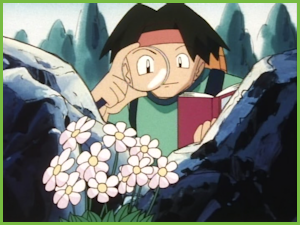 |
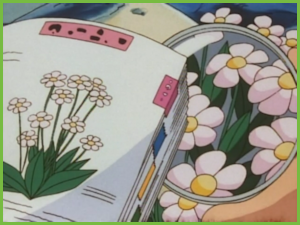 |
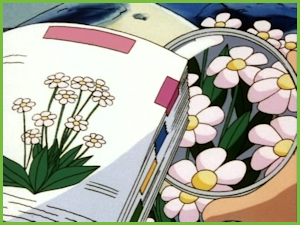 |
Outside of flashbacks to older episodes, the Pocket Monsters animated series hasn't really been allowed to include written Japanese in the show since the Orange Islands started and have therefore had to settle for using markings like these that vaguely suggest the idea of a written language. And yet apparently even that's not allowed anymore.
It really makes you wonder why 4Kids would waste the time and money on such a pointless edit. I mean, the easiest explanation is that the people working on the dub couldn't tell actual Japanese writing apart from random scribbles, but if I want to be a bit nicer I guess maybe this could have been a business decision to keep budgets from being cut? Like, 4Kids spent X amount of money on Season 1, and Y amount of money on Season 2, and so in order to keep from having their budgets slashed for Season 4 they needed to make sure to spend at least Z amount of money for Season 3? And so, to that end, they look for nonsense like this to edit...? (shrugs)
Dialogue Edit
Our heroes meet "Gulzar":
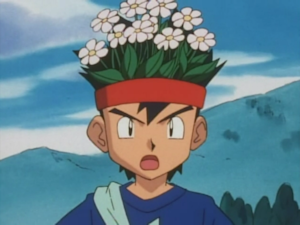
| Japanese
(original) |
Japanese
(translated) |
English
Dub |
| ジュンジ 「10センチの草にも1メートル28センチの魂!草マスターを目指し
ているジュンジ様の頭上ガーデニングを引き抜こうなんてふてえやつ!」 |
Junji: "A ten centimeter
tuft of grass has just as much spirit as a 1 meter 28 centimeter boy!
You there! How dare
you pull on the head mounted garden of a boy aiming
to be a Grass Master -- me, the great Junji-sama!" |
Gulzar: "So! Just because
you're bigger than I am you think you can come here and pick on me, do
ya? You picked on the wrong kid, 'cause I'm Gulzar, the greatest grass
Pokémon Trainer in the Orange Islands. So get lost!" |
OK first of all, these two introductory speeches are completely different bla bla bla BUT ANYWAY WE NEED TO TALK ABOUT HOW THE DUB CHANGED THIS KID'S NAME TO GULZAR. What the actual hell!? Is this maybe the worst dub name in the history of ever? 4Kids seriously looked at this kid, the kid in the screenshot above, and was like "You know what? This kid looks like a Gulzar to me."
Anyway, it's kind of interesting how "Junji" as a name is considered "too foreign" or whatever for the dub to keep as-is, and so the "solution" 4Kids came up with was to rename him "Gulzar."
The kids try to placate Gulzar:
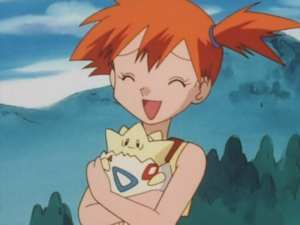
| Japanese
(original) |
Japanese
(translated) |
English
Dub |
| ケンジ 「ああ~ ご… ごめん ごめん。雑草だと思ったんだ」 |
Kenji: "Ah, I'm...I'm sorry!
Really! I thought those were just weeds." |
Tracey: "I'm sorry, I was just
looking for some flowers to feed our Pokémon." |
| ジュンジ 「オレの
このガーデニングはただの雑草じゃないぞ!由緒正しい草マスターに 失礼だろう!ここでポケモン勝負だ!」 |
Junji:
"What!? My garden isn't a bunch of weeds! How dare you say such a thing
to a Grass Master like myself! That's it, let's have a Pokémon
battle,
right here, right
now!" |
Gulzar: "You think just
because I grow some flowers in my hair you can come along and use my
head as a snack bar for your hungry Pokémon, do you? How'd you
like to have a battle?" |
| カスミ 「まあまあ 悪気があって言ったわけじゃないし…」 |
Kasumi: "Now now, he wasn't
trying to insult you or anything." |
Misty: "I always wondered what
it would be like to wear flowers in my hair. Ha ha." |
Misty replies to Gulzar's claim of him growing flowers in his hair (???) with a completely out of left field comment about wanting to wear flowers in her hair, a sentence so completely random it somehow comes back around to being hilarious again.
The battle between Squirtle and Gloom gets underway:
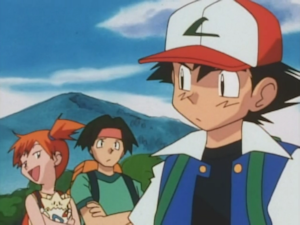
| Japanese
(original) |
Japanese
(translated) |
English
Dub |
| カスミ 「何やってんの?草ポケモンに水やってどうすんのよ~!」 |
Kasumi: "What're you doing?
Trying to win by watering a Grass Pokémon?" |
Misty: "You should know better
than to water a weed Pokémon, Ash. Use your head!" |
| サトシ 「しょうがないだろ!腹減って頭がボーッとしちゃってるんだからさ」 |
Satoshi: "Hey, give me a
break! I'm so hungry I'm kind of spacing out here!" |
Ash: "Yeah, well how am I
supposed to use my head when my stomach is totally empty?" |
| カスミ 「いつもボーッとしてんじゃないの」 | Kasumi: "But aren't you always
spacing out though?" |
Misty: "Guess your head takes
after your stomach." |
| サトシ 「そんなことないよ!」 | Satoshi: "Am not!" |
Ash: "Mind your own business!" |
The fact that the young orange haired girl insults her friend is present in both versions, though the actual insult itself ("you're always spaced out" vs. "you have no brains") is a bit different.
The script from when Snorlax comes out of its Poké Ball to Gulzar calling the match off is all pretty decent, all things considered. The next change worth bringing up occurs as Gulzar calls off the battle:
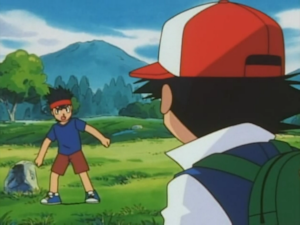
| Japanese
(original) |
Japanese
(translated) |
English
Dub |
| ジュンジ 「ああ~ん!この勝負は無効だ!」 |
Junji: "That's it! I'm calling
off the match!" |
Gulzar: "I'm going back home!" |
| サトシ 「ちょっと待って!」 |
Satoshi: "Hey, wait a
minute..." |
Ash: "What about the battle?" |
| ジュンジ 「大事な頭上ガーデニングと弁当まで食われてもう戦う気力も起きない よ!」 | Junji: "Why should I? That
Kabigon of yours ate both my precious head mounted garden and my lunch...I don't
have the energy to fight anymore!" |
Gulzar: "Listen, kid. I don't
mind being beaten by a
Pokémon but I'm not gonna stand around and get eaten by one." |
| サトシ 「それはいいんだけど…この近くにポケモンセンターはないかな?モンス ターボールがこんなになっちゃってカビゴンを戻すことができないんだ」 | Satoshi: "That's fine, but
before you go, do you know if there's a Pokémon Center around
here? I'm can't recall my Kabigon with my Monster Ball like this." |
Ash: "Snorlax isn't going to
eat you. And I wasn't the one who wanted to battle in the first place.
But now my Poké Ball's broken, and I can't get it fixed unless
we get to a Pokémon Center." |
| ジュンジ 「フンッ ポケモンセンターはあの山を越えた向こう町にしかないぞ。峠道を越えるしかないんだ」 | Junji: "Ugh, fine. The only
one
around here's in the town on the other side of that mountain. But
you'll have to go over it to get there." |
Gulzar: "Well you're pretty
lucky. There's a Pokémon Center a couple miles from here...but
the only way to get there is over that mountain." |
In the original Junji isn't worried about Satoshi's Pokémon viciously murdering him and then ripping the flesh off his bones; instead, he's so upset at the loss of both his "garden" and his lunch box he doesn't have the energy needed to continue fighting anymore.
Also, Ash's "And I wasn't the one who wanted to battle in the first place" seems a bit needlessly antagonistic, don't you think? Don't victim blame the poor kid, Ash!
Gulzar runs off:
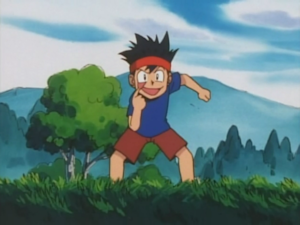
| Japanese
(original) |
Japanese
(translated) |
English
Dub |
| ジュンジ 「いい気味だ! ハハハハッ」 |
Junji: "Serves you right!
Hahaha!" |
Gulzar: (laughs) |
The English dub removes Junji's dialogue here, for some reason.
On the bright side, at least 4Kids left this footage intact! Shots of characters who do the bii-da thing where they pull an eyelid down and stick out their tongues will get cut from future episodes, for some reason, but for now at least it seems like this kind of thing is still safe.
Our heroes wonder what to do next:
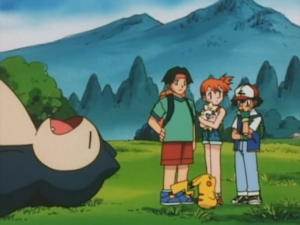
| Japanese
(original) |
Japanese
(translated) |
English
Dub |
| ケンジ 「う~ん どうしよう?」 |
Kenji: "Hmm, what're we gonna
do now?" |
Tracey: "What do we do?" |
| サトシ 「カビゴンを置いてくわけにはいかないしな」 |
Satoshi: "Well we can't just
leave Kabigon behind..." |
Ash: "We gotta figure out some
way to bring Snorlax over that mountain." |
| カスミ 「じゃあ 方法は ただ1つ。連れていくしかないわね」 |
Kasumi: "Then there's only one
thing left to do. We'll just have to bring it with us." |
Misty: "That's gonna be almost
impossible, Ash. Look at how big Snorlax is, and look at how high that
mountain is!" |
Originally we see Satoshi toy with the idea of maybe leaving Kabigon behind while he (or maybe all three of them?) go ahead to get its Monster Ball fixed. If his Pokémon just spends the whole time sleeping then it should probably be OK, right? The young Trainer decides that'd be too irresponsible of him and so the three decide they have no choice but to take Kabigon with them.
In the English dub Ash doesn't entertain the idea at all. Misty, meanwhile, decides to be a real Debbie Downer here by talking about how impossible the task ahead of them is going to be.
Our heroes start pulling Snorlax up the mountain:
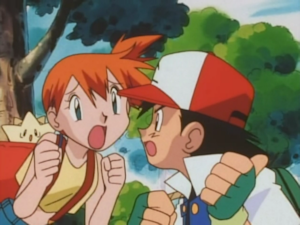
| Japanese
(original) |
Japanese
(translated) |
English
Dub |
| サトシ 「はあ~ そろそろ ひと休み」 |
Satoshi: "Whew! It's about
time we take a break." |
Ash: "We better take a break." |
| カスミ 「ええ~!ちょっと!今始めたばっかりじゃな~い!」 |
Kasumi: "Ah! Now hold on, we
only just got started!" |
Misty: "Ah! You can't rest
now! We have a long way to go!" |
| サトシ 「だって こいつむちゃくちゃ重いんだぞ~!」 | Satoshi: "Yeah, but this
thing's really heavy!" |
Ash: "I don't need a rest,
Misty, but Pikachu does!" |
| ピカチュウ 「ピカ…ピカ…」 |
Pikachu: "Pika...Pika..." | Pikachu: "Pika...Pika..." |
In the original Satoshi doesn't try to use Pikachu as a scapegoat the way Ash does.
Tracey has a plan:
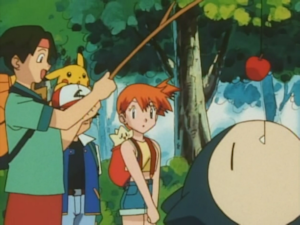
| Japanese
(original) |
Japanese
(translated) |
English
Dub |
| ケンジ 「さあ カビゴン。おいしいごはんだよ!目を覚ましておくれ。おっ
いけるぞ!」 |
Kenji: "Alright, Kabigon. I've
got some yummy food for you. How about waking up for me? Oh, it's
working!" |
Tracey: "It's simple. We'll
use the apple as bait. I'll run ahead with it, and Snorlax will be
right behind. Yes, wake up." |
| (The sleeping
Pokémon eats the
apple) |
||
| ケンジ 「ガーン!釣り餌作戦ウマくいくと思ったのに~!」 | Kenji: "Oh no! I thought my
fishing bait strategy was sure to work!" |
Tracey: "Snorlax wasn't
supposed to eat the apple!" |
Kenji talks directly to his friend's sleeping Pokémon in the original and doesn't bother explaining his super obvious plan to his friends, but I guess 4Kids thought its viewers wouldn't get what he's trying to do here and so they changed the dialogue to have Tracey spell things out a bit more plainly.
Snorlax chases Ash, who's now dressed like an apple, up the mountain:
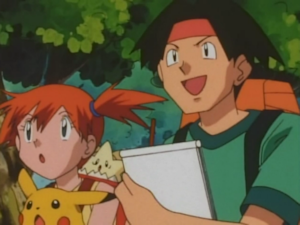
| Japanese
(original) |
Japanese
(translated) |
English
Dub |
| ケンジ 「ごちそ
うを前にしたときのカビゴンの動きは本当にすばらしい!400キロとは思えない素早い動きだ」 |
Kenji: "Seeing Kabigon move
like that before it's even had a chance to eat is really something
else! Can you believe that speedster there weighs in at 400 kilos?" |
Tracey: "This is amazing,
Misty. Who would've guessed something that big could run that fast?
Ash'll have Snorlax over that mountain in no time now." |
| カスミ 「メモ
取ってる場合じゃないかもよ」 |
Kasumi: "This probably isn't
the best time to be jotting down notes." |
Misty: "But Tracey, what if
Snorlax catches Ash?" |
Kenji brings up Kabigon's weight from the games, something the English dub neglects to do.
There are a few one-liners that 4Kids changes ("I'm done for" becomes "I'm applesauce," for example) but none of them are major enough to break out a comparison table for. The next exchange to get that honor belongs to the scene, where Tracey and Misty catch up with Ash:
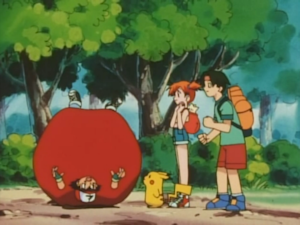
| Japanese
(original) |
Japanese
(translated) |
English
Dub |
| ケンジ 「サトシ よくやった!」 |
Kenji: "Satoshi! You did
great!" |
Tracey: "That was incredible!" |
| カスミ 「もう峠のてっぺんよ」 |
Kasumi: "We're already at the
top of the mountain!" |
Misty: "You made it all the
way to the top!" |
| ピカチュウ 「ピカチュウ~」 |
Pikachu: "Pikachu~" |
Pikachu: "Pikachu~" |
| サトシ 「もうごちそうの役はごめんだよ~」 | Satoshi: "I am officially over
playing the role of Kabigon's bait for the day." |
Ash: "I'm an apple for a day
and I need a doctor right away." |
The English dub has Ash make a reference to the English language proverb "an apple a day keeps the doctor away" while in the Japanese version he simply states he's ready to get out of the apple costume.
Eyecatch
Junji's Kusaihana gets replaced with a random Marowak.
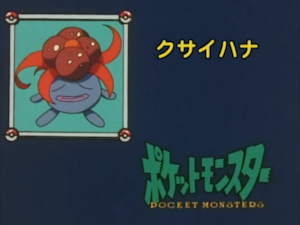 |
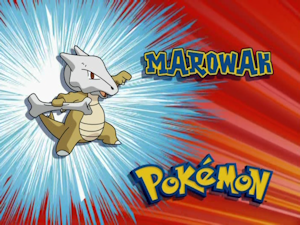 |
This isn't really much of a Kusaihana episode either, to be fair, but the Japanese version already used Kabigon for its eyecatch Pokémon back in the episode where Satoshi caught it and so I guess they thought it'd be weird to use Kabigon again here so soon. And so, Kusaihana it is! Marowak, on the other hand, seems to just be a random Pokémon choice.
Dialogue Edit
Our heroes arrive at the Pokémon Center:
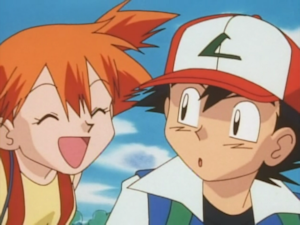
| Japanese
(original) |
Japanese
(translated) |
English
Dub |
| サトシ 「すごい人だな~。みんなモンスターボールを壊しちゃったのかな~?」 |
Satoshi: "Look at all the
people! Do you think they all broke their Monster Balls too?" |
Ash: "Do you think everybody
in this crowd's here to have their broken Poké Balls fixed just
like I am?" |
| ジュンジ 「そんなボーッとしてるやつはお前ぐらいだよ」 |
Junji: "Nah. You're about the
only person who'd space out enough to do a thing like that." |
Gulzar: "Nah. I don't think
there are that many people who are that dumb." |
| サトシ 「なんだと!」 |
Satoshi: "What'd you say?" |
Ash: "Oh yeah?" |
| カスミ 「うんうん!サトシは いっつもボーッとしてる」 |
Kasumi: "I agree! Satoshi's
always spacing out!" |
Misty: "Hmm hmm hmm hmm. I
kind of like him. Don't you?" |
Kasumi doesn't say anything about "liking" Junji in the original; she simply agrees with the kid, adding that Satoshi always has his head in the clouds.
Gulzar (I still can't believe that's the name the dub went with) explains the island's situation:
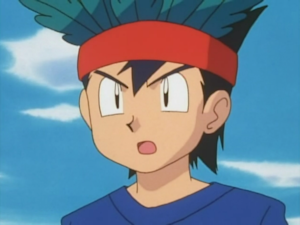
| Japanese
(original) |
Japanese
(translated) |
English
Dub |
| ジュンジ 「このクネンボ島には大きな港も空港もないからこのシケで食料の入荷
が遅れてるんだ。もちろん ポケモンフーズもね」 |
Junji: "Here on Kunenbo Island
there aren't any large seaports or airports and so our shipment of
food's been delayed due to the stormy weather. Of course, the
Pokémon Food's late as well." |
Gulzar: "For your information
this island doesn't have an airport or a seaport so supplies get
delivered by plane. But this week's shipment's behind schedule and
these people are all out of Pokémon food." |
| カスミ 「え~! ここでもポケモンフーズは手に入らないの?」 |
Kasumi: "Oh no! So you can't
get Pokémon Food here either?" |
Misty: "Huh!? Maybe we better
look around and find some of those edible plants." |
This deceptively short bit of dialogue is really jam packed with a lot of small differences.
- Junji states the name of the island for us for the second time this episode, something the English dub still hasn't gotten around to for some reason.
- Junji says there
aren't any large
seaports or airports on the island, while Gulzar states there aren't
any seaports or airports at all. Which,
by the way, kind of contradicts a line of dialogue Ash said at the end
of the previous episode (Captain Aidan:
"Well, what's next? Where are you all headed now?" Ash: "We're headed to the next town.
We heard there's a port there and that's the closest place to the next
island"). Later on
both versions will have the show's main character question how the
cargo plane
can deliver the food if there aren't any airports on the island,
implying Junji's dialogue here about there maybe being at least a small
airport somewhere is possibly mistaken.
- Junji never states
how often the shipments are made while Gulzar claims they're made once
a week.
- Junji tells us the current shipment's been delayed due to the stormy weather, aka the same stormy weather the narrator mentions at the beginning of the episode. The English dub neglects to bring this up.
- The English dub
implies the delayed shipment's only
for Pokémon food while the Japanese version makes it clear that
it's the food for both Pokémon and humans
that's been delayed.
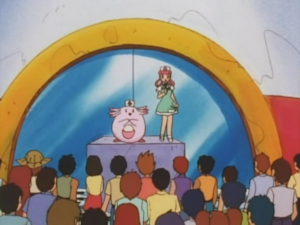
| Japanese
(original) |
Japanese
(translated) |
English
Dub |
| ジョーイ 「皆さん 聞いてください!今
隣の島のポケモンセンターに連絡してセスナで 皆さんとポケモンの食料を緊急空輸してもらえるよう話がつきました」 |
Joy: "Everyone, please listen
up! I just got off the phone with the Pokémon Center on the next
island over and they said they're arranging to have an emergency Cessna
plane take off with food for you and your Pokémon." |
Nurse Joy: "May I have your
attention please? I've just been informed that the weekly shipment left
Valencia Island early this morning and we should be receiving a fresh
supply of Pokémon food in just a few minutes." |
The Japanese version tells us the shipment's coming from "the next island over" (Unshiu Island, probably? Both Cleopatra and DekaPoké Island seem to be uninhabited) while the English version tells us it's coming all the way from "Valencia Island." Which, if you actually look at a map of the Orange Archipelago, doesn't really make any sense.
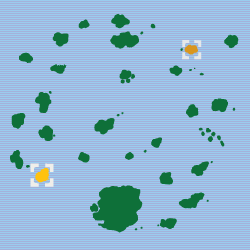
Valencia Island's in the southwest while the island in this episode is all the way up in the northeast. Why would the island in this episode be relying on food shipments from an island on the opposite side of the archipelago when there are so many other islands that're a whole lot closer? Why not just say "neighboring island" like in the Japanese version?
The Japanese version also mentions the shipment will be coming in on a Cessna plane, a detail the English dub leaves out. The Japanese version will use the term cessna several times in the next few lines of dialogue but the English dub opts for "cargo plane" instead.
Before long the Rocket trio make their debut. There's a line where Musashi states the food's 500 meters away while the English dub states it's only 50 meters away, but other than that there isn't much worth mentioning until the trio's motto:
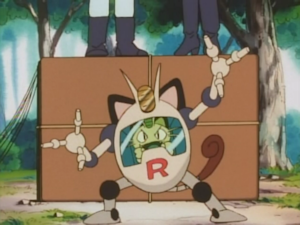
| Japanese
(original) |
Japanese
(translated) |
English
Dub |
| ムサシ 「銀河をかけるロケット団だんの2人には」 |
Musashi: "The Rocket-Dan who
holds up the galaxy are the two of us." |
Jessie: "Team Rocket blast off
at the speed of light!" |
| コジロウ 「ホワイトホール白いあしたが待ってるぜ」 |
Kojirou: "A white hole - a
white tomorrow is waiting." |
James: "Surrender now or
prepare to fight!" |
| ニャース 「あっ! そして
初登場!アーマードニャースニャ~!驚いたニャ?魂込めて作った秘密兵器アーマードニャースニャ~!」 |
Nyarth: "Ah! And for the first
time ever, Armored Nyarth Nya! Are ya surprised Nya? This is the
Armored Nyarth, a secret weapon made with all our hearts and souls Nya." |
Meowth: "And I'm prepared to
fight all night! If you twerps want this chow you're gonna have to come
through the Mecha-Meowthinator to get it!" |
The "Armored Nyarth" gets renamed the "Mecha-Meowthinator" for the English dub.
(also, the closed captions on the Viz DVD for this episode spell "mecha" as "mekka," for some reason)
Misty responds:
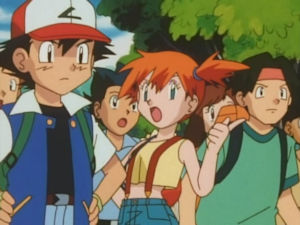
| Japanese
(original) |
Japanese
(translated) |
English
Dub |
| カスミ 「その秘密兵器でやることがみんなやポケモンの食べ物の横取りなんてや
ることが相変わらずセコいわよ!」 |
Kasumi: "A secret weapon
you're just gonna use to swipe the food from these people and their
Pokémon. You're as shameful as ever!" |
Misty: "If we don't figure out
some way to get that food away from Team Rocket all the Pokémon
in the island will have to go without anything to eat for another whole
week." |
| サトシ 「そのとおり!」 |
Satoshi: "Yeah!" |
Ash: "Yeah, you're right." |
The English dub continues to insist the food shipments only come once a week, something that's not even implied in the original.
The Rocket trio put things to a vote:
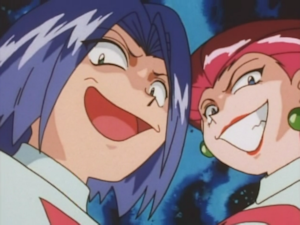
| Japanese
(original) |
Japanese
(translated) |
English
Dub |
| ムサシ 「ほざけジャリンコども!でも
お聞き!ポケモントレーナーのお嬢ちゃま お坊ちゃま方。このポケモンフーズが欲しかったらそこのピカチュウを私たちに渡すのよ!」 |
Musashi: "Who cares ya twerps!
But listen up! All you Pokémon Trainer boys and girls out there.
If you want this Pokémon food then all you've gotta do is hand
over that Pikachu there." |
Jessie: "Why don't we make a
deal? We'll let all you Poké twerps have your precious
Poké food back so your Pokémon won't go hungry and all
you have to give us is your puny little Pikachu." |
| サトシ 「なんだと」 |
Satoshi: "What'd you say?" |
Ash: "That's not fair!" |
| ピカチュウ 「ピ~カ!」 |
Pikachu: "Pi~ka!" | Pikachu: "Pi~ka!" |
| コジロウ 「オレたちが用があるのはそのピカチュウだ。おとなしく渡してくれた
らおなかすかしているみんなもみんなのポケモンたちもおいしいものが食べられるんだけどな~」 |
Kojirou: "We're only here for
that Pikachu. So if you hand it over quietly all you
hungry people and your Pokémon'll be able to eat all this
delicious food." |
James: "Why don't we let
everyone decide? That seems fair. Either your Pokémon go without
food for a week or we give you this entire cargo box crammed with
delicious delectables for your famished little Pokémon to feast
on." |
| ムサシ 「食べられるんだけどな~」 | Musashi: "All this delicious
food~!" |
Jessie: "And all we get is
Pikachu!" |
The English dub emphasizes, almost to a comical degree, that the contents of the box the Rocket trio have stolen is Pokémon food and Pokémon food only, while in the Japanese version it's made clear that this shipment contains food for both Pokémon and humans. Is this maybe an attempt at censorship? Like, starving Pokémon are fine, but starving Pokémon and starving humans is crossing a line, somehow? And so the dub makes it so that only the Pokémon are in danger of starving to death?
Oh well, at least James seems to have finally figured out what the word "famished" means!
Gulzar berates the people for even considering giving up Pikachu:
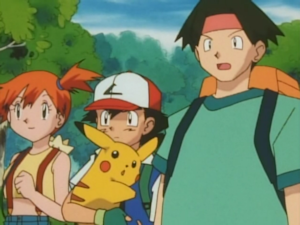
| Japanese
(original) |
Japanese
(translated) |
English
Dub |
| ケンジ 「見かけは変わっているがよく観察するとただの草マスターじゃない。心
に花を咲かせているよ」 |
Kenji: "He might look odd but
if you step back and observe him you'll see he's no ordinary Grass
Master. His heart's as in bloom as a flower." |
Tracey: "Gulzar may have
leaves growing out of his head but he just proved he has a really good
heart. Guess you can't judge a book by its cover." |
| カスミ 「頭に草を生やしてるだけにセリフはくさいけど」 |
Kasumi: "The things he says
only stink because he has grass coming out of his head." |
Misty: "And the grass is
always greener when it's on somebody else's head." |
"Gulzar may have leaves growing out of his head but he just proved he has a really good heart" doesn't actually make any sense, right? What does leaves "growing out of his head" (by the way Tracey, he's clearly just wearing a headband with foliage tucked inside) have to do with him having a good heart? Do people with bad hearts tend to have grass growing out of their heads? Huh?
Pikachu vs. Meowth:
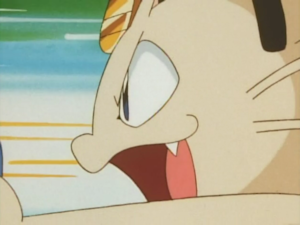
| Japanese
(original) |
Japanese
(translated) |
English
Dub |
| ニャース 「ニャース!パワードみだれひっかきニャ!」 |
Nyarth: "Nyarth! Use Powered
Fury Swipes!" |
Meowth: "Now I'll show ya what
this baby can do! Power swipes on!" |
In the original Nyarth orders himself to use Midare Hikkaki, or "Fury Swipes," but for some reason the English dub changes this to "power swipes." 4Kids will get it right the second time around -- when Snorlax appears Meowth starts the battle by saying "I'll put my Fury Swipes into overdrive! Power on!" -- so it's only this first line that gets changed.
After realizing none of his attacks are working on Snorlax, Meowth resorts to one final tactic:
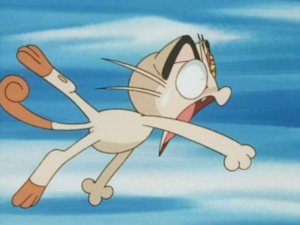
| Japanese
(original) |
Japanese
(translated) |
English
Dub |
| コジロウ 「最後の手段だ!すてみタックルを使うんだ!」 |
Kojirou: "You've got one last
resort! Use Double-Edge!" |
James: "You've got one weapon
left! Use the turbo Body Slam!" |
| ニャース 「うん? このスイッチだニャ。いけ!
ニャース、すてみタックルニャ~アイアイニャ~!」 |
Nyarth: "Hm? This button here
Nya. 'Go Nyarth! Use Double Edge!' 'Aye, aye sir Nya~'" |
Meowth: "Yeah, I almost forgot
about that. Alright Snorlax, get ready for destruction!" |
| (The mecha
ejects its pilot) |
||
| ニャース 「あれ? ああっ あ~れ~!これじゃ ほんとのすてみタックルだニャ~!」 | Nyarth: "Huh? Aaah~! This
really is a double edged attack!" |
Meowth: "Help! I don't wanna
get destructed!" |
For starters, the attack Kojirou calls out is Sutemi Takkuru, which should have been translated as "Double-Edge" for the dub but ended up getting changed to "Body Slam" instead.
And, while you can make Double-Edge work as a translation of the dialogue in the Japanese version, even that doesn't fully capture what Nyarth says in the original. That's because in Japanese, the attack that got localized as "Double-Edge" is actually known as Sutemi Takkuru, which translates more directly to "Life-Risking Tackle" than anything involving double edged swords. The sutemi part, in particular, can be translated even more literally as "to throw your body away" (捨て身), and when Nyarth is being ejected from his robot the Armored Nyarth literally is "throwing his body away." This prompts Nyarth to remark Kore ja honto no sutemi takkuru da nya (これじゃほんとのすてみタックルだニャ~!), which can be translated as "This really is risking my life" or "This really is throwing my body away!"
4Kids could have made "Double-Edge" work while maintaining the spirit of the Japanese original, but they opted to just go with a completely different attack name instead.
Sound Effects Edit
The sound effect of Nyarth hitting his teammates during the moment in the screenshot below gets muted for the English dub.
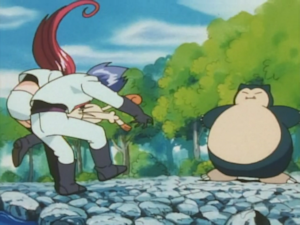
So I guess the practice of removing sound effects to help "lessen" the impact of the violence on-screen is going to continue throughout Season 3 as well. It all seems pretty pointless to me -- does the network really think not hearing the impact, while still being able to see it, makes any difference whatsoever? -- but at the end of the day it's not that big a deal. Pointless and dumb, yes, but not the worst thing ever either.
Dialogue Edit
Snorlax is about to use Hyper Beam:
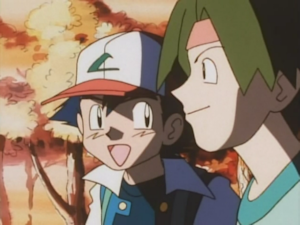
| Japanese
(original) |
Japanese
(translated) |
English
Dub |
| サトシ 「あれは…」 |
Satoshi: "What's that...?" |
Ash: "Tracey, look!" |
| ケンジ 「あれはカビゴンのはかいこうせんだ!」 |
Kenji: "That's Kabigon's Hyper
Beam attack!" |
Tracey: "Wow! Snorlax is using
its Hyper Beam attack!" |
| サトシ 「えっ ほんとに?いけカビゴン!はかいこうせんだ!」 |
Satoshi: "Eh? Really!? Alright
then, go Kabigon! Use Hyper Beam!" |
Ash: "(chuckles) I knew that!
Go, Snorlax! Use that Hyper Beam attack!" |
Satoshi doesn't recognize Hyper Beam at first, though 4Kids changes this so that Ash does.
Ash congratulates his Pokémon on its victory:
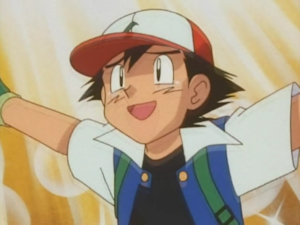
| Japanese
(original) |
Japanese
(translated) |
English
Dub |
| サトシ 「よくやったカビゴン!」 |
Satoshi: "That was amazing,
Kabigon!" |
Ash: "Snorlax, you saved
Pikachu!" |
| カビゴン 「カ~ビ~」 |
Kabigon: "Ka~bi~" |
Snorlax: "Snor~la~!" |
| サトシ 「お前が燃えて戦うようになるなんて!やる気を出してくれて!感激だよ
~」 |
Satoshi: "You lit the fire in
you to fight! You really put your heart into it! I'm so happy right
now~!" |
Ash: "OK, you big, lovable
lug! Come and give me a great big hug!" |
Originally, Satoshi's happy because his giant Pokémon finally started doing more than just sleeping and eating and has finally joined the ranks of his fighting Pokémon. Ash, on the other hand, decides to recite poetry at Snorlax instead.
After Ash returns his Snorlax to its Poké Ball, Gulzar approaches him:
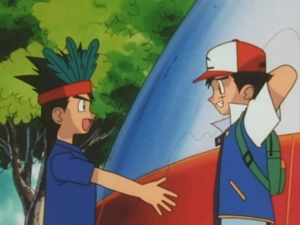
| Japanese
(original) |
Japanese
(translated) |
English
Dub |
| ジュンジ 「あんなメカに勝っちゃうなんてすごいポケモンを育てていたんだね。
見直したよ」 |
Junji: "You really trained
your Pokémon well for you to be able to win against that robot.
I was wrong about you." |
Gulzar: "I was all wrong about
you, Ash. You were really brave to battle that Meowth machine. I'm
sorry." |
| サトシ 「えっ? エヘヘッ まあね」 |
Satoshi: "Eh? Ah, gee..." |
Ash: "Aw, forget it." |
| ジュンジ 「ぜひまたボクとポケモン勝負してくれよな。特にあのカビゴンと」 |
Junji: "You'll have a battle
against me again someday, right? Especially with that Kabigon of yours." |
Gulzar: "I hope I'm lucky
enough to battle against you again someday. It'd be a great honor." |
| サトシ 「あ… ああ」 |
Satoshi: "Ah...sure!" |
Ash: "Uh, yeah!" |
Junji specifically states he wants to battle Satoshi's Kabigon again, while Gulzar seems more focused on Ash the Trainer rather than any of his Pokémon.
Finally, the ending narration:
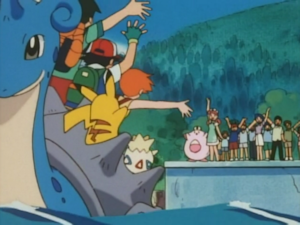
| Japanese
(original) |
Japanese
(translated) |
English
Dub |
| ナレーション 「カビゴンの活躍でサトシたちとクネンボ島のポケモントレーナー
たちとの心もぐっと近づき熱い友情が芽生えたのだった」 |
Narrator: "Thanks to Kabigon,
Satoshi and his friends got close to the Pokémon Trainers of
Kunenbo Island, and formed a warm friendship with one in particular." |
Narrator: "What started out as
a stormy relationship ended in a new friendship for Ash and Gulzar. The
storm at sea is over too, and so our heroes are on the way to their
next Pokémon adventure." |
The Japanese version never bothers to mention how the choppy waves that stranded Satoshi and his friends on Kunenbo Island in the first place have finally calmed down enough for them to leave the island, and so the dub adds in a line here about how "the storm at sea is over too."
| Previous Episode |
Next
Episode
|
This page was last updated on January 12th, 2025
Found an error or omission? Please help me keep this page current and error-free by e-mailing me with a description of the issue.

